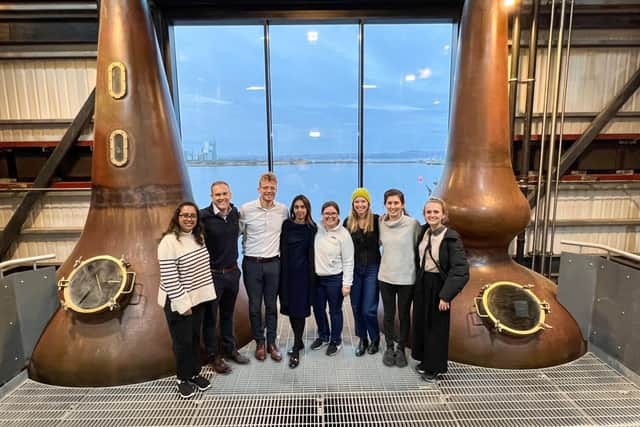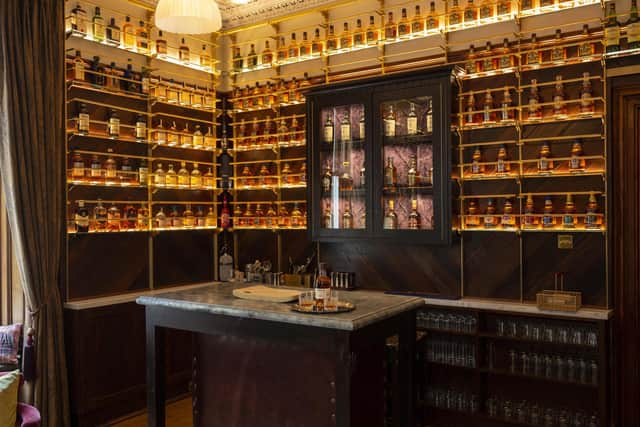Scottish whisky: How Government attachés are promoting Scotch across emerging markets around the world
As the Scotch whisky industry was officially breathing a sigh of relief due to the freeze in alcohol duty in this month’s Autumn Statement, a total of 11 UK agri-food attachés were visiting Britain, including making two stops in Scotland.
The attachés spent last week touring the country meeting food and drink producers, including a visit to The Port of Leith Distillery and Loch Striven. These diplomats are based in British embassies and consulates around the world – in Canada, Mexico, USA, Brazil, Kenya, India, Japan, China, Thailand and Vietnam – and work to remove trade barriers, identify emerging international markets and tap into growing demand worldwide for quality goods from UK farmers and producers.
Advertisement
Hide AdAdvertisement
Hide AdWhile some deals have been done to secure new markets for meat, whisky is the focus for some of these attachés, given it is the world’s number one internationally traded spirit. Renowned on the global stage for its heritage and craft, Scotch is exported to around 180 markets and this trade was worth over £6 billion, for the first time, in 2022. The drink accounts for 25 per cent of all UK food and drink exports, 77 per cent of Scottish food and drink exports, and supports more than 10,000 jobs in Scotland.


The equivalent of 53 bottles of Scotch whisky are shipped overseas every single second. So what’s it like working in new markets and what do the consumers here think of Scotch whisky? Two Department for Environment Food and Rural Affairs (Defra) attaches, based in Brazil and Vietnam, spoke to The Scotsman about their work, what trends and challenges they face and how whisky and Scotland are perceived in these locations.
The Vietnam attaché has been living and working out in Hanoi for around seven months and covers three “exciting and vibrant markets” in South East Asia – Vietnam, Indonesia and Singapore. The Brazil attaché covers the Mercosur region, which includes Argentina, Brazil, Paraguay and Uruguay.
South East Asia (SEA) is in a huge period of growth, with a burgeoning middle class, which provides opportunities as the Vietnam attaché explains. “It's no secret that South East Asia arguably presents the most exciting opportunity for investment and exports in the world, largely thanks to the economies in SEA seeing rapid development and soaring levels of middle-class consumers who can afford to enjoy high quality whisky produced in Scotland,” the attaché says.
"For example, according to the World Bank, economic growth in Vietnam is expected to grow by 4.7 per cent in 2023, increasing to 5.5 per cent in 2024 – figures many western nations would only dream of achieving.”


When it comes to Brazil, there is "untapped potential”, as the attaché explains.
“There is untapped potential for whisky exports across Mercosur, especially in Brazil,” the attaché says. “According to the Scotch Whisky Association (SWA), Brazil is the fourth largest global market for Scotch whisky by volume, with 93 million bottles sold in 2022. This clearly demonstrates demand from consumers in the region.”
Scotland and Scotch whisky are perceived well overseas, with consumers in South East Asia having a “strong affinity with Scotch, recognising its high quality and associate it with prestige and success”. The attaché adds: “Consumers across the region responsibly enjoy Scotch for what it is – a premium product which represents both a drink and an experience in one.” Consumers in Brazil perceive that Scotland is linked to a richness in culture, with Scotch whisky seen as a “high-quality beverage and is associated with provenance”, the Brazil attaché says. “As with other products, such as Scottish salmon, we're keen to increase exports to the region,” they said.
Advertisement
Hide AdAdvertisement
Hide AdAlthough perceptions are good, the Vietnam attaché has come across some challenges with counterfeits. They said: “While Scotch has enjoyed considerable success in the region, it isn't without its challenges. A prime example of this is the prevalence of counterfeit and illicit trade, which unfortunately features in many South East Asian countries. This trade risks not only the reputation and income for Scottish whisky distillers, but presents wider risks to public health and tax revenue for host countries. The UK Government works closely with the SWA to highlight these risks and seek collaboration on reducing levels of illicit trade.”
Despite this, the future looks bright for whisky in both regions. The Vietnam attaché says: “With South East Asian economies expected to see continued growth for the foreseeable future, I've no doubt in the ability of Scotch to take full advantage of this and increase its penetration across the board. Key to this though will be maintaining pressure on governments in the region across a range of areas holding back Scotch from developing further, including illicit trade and issues with labelling requirements to name but two.”
The Brazil attaché adds: “With a growing middle-class in Brazil, reduction of whisky tariffs in Argentina and a surge of whisky exports in Paraguay and Uruguay, I hope this creates opportunities to bolster Scotch whisky exports in the coming years. This would create local jobs in Scotland and consequently lead to economic growth. We are also looking at opportunities to build on the global success of whisky to showcase the unique heritage and provenance of other iconic Scottish food and drink products.”
During the attaché visit, Ian McKendrick, SWA international director, said: “Supporting our member companies to reduce and remove barriers to trade in established and emerging markets is a key priority, and we work closely with the agri-food and drink attachés and Defra to secure the best possible international environment for Scotch whisky.
"The placement of attachés in key markets around the world means their input, analysis and market intelligence is a vital channel of information for the industry. We are pleased to be able to host them on a fact-finding mission to Scotland, so they can deepen their knowledge.”
Comments
Want to join the conversation? Please or to comment on this article.